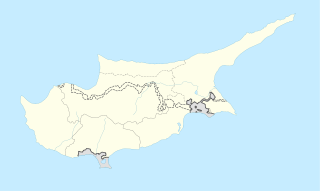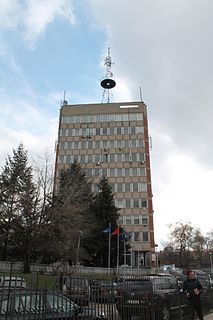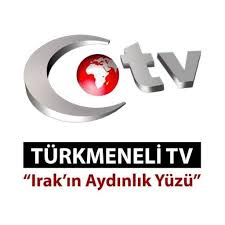
Northern Cyprus, officially the Turkish Republic of Northern Cyprus, is a de facto sovereign state that comprises the northeastern portion of the island of Cyprus. Recognised only by Turkey, Northern Cyprus is considered by the international community to be part of the Republic of Cyprus.

North Nicosia or Northern Nicosia is the capital and largest city of the de facto state of Northern Cyprus. It is the northern part of the divided city of Nicosia and is governed by the Nicosia Turkish Municipality. As of 2011, North Nicosia had a population of 61,378 and a metropolitan area with a population of 82,539.

Bayrak Radio Television Corporation, is the official radio and television broadcasting corporation of the self-proclaimed Turkish Republic of Northern Cyprus. Bayrak means flag in Turkish.
TAK, Türk Ajansı Kıbrıs is the news agency in the Turkish Republic of Northern Cyprus responsible for disseminating TRNC news internationally and disseminating foreign news in the TRNC.
The media of Georgia refers to mass media outlets based in the Republic of Georgia. Television, magazines, and newspapers are all operated by both state-owned and for-profit corporations which depend on advertising, subscription, and other sales-related revenues. The Constitution of Georgia guarantees freedom of speech. Georgia is the only country in its immediate neighborhood where the press is not deemed unfree. As a country in transition, the Georgian media system is under transformation.

Northern Cyprus is recognised only by Turkey, a country which facilitates many of its contacts with the international community. After declaring independence from the Republic of Cyprus, Northern Cyprus' relations with the rest of the world were further complicated by a series of United Nations resolutions which declared its independence legally invalid. A 2004 UN Referendum on settling the Cyprus dispute was accepted by the Turkish Cypriots but rejected by the Greek Cypriots. After that, the European Union declared its intentions to assist in reducing the economic isolation of Northern Cyprus and began giving aid to the territory. However, due to pressure from Greece and the Republic of Cyprus, this aid coming from EU funds cannot be used on Greek Cypriot land and property nor on public bodies. As a result, these funds can be used only on 29 percent of people on the island of Cyprus.
The media of Armenia refers to mass media outlets based in Armenia. Television, magazines, and newspapers are all operated by both state-owned and for-profit corporations which depend on advertising, subscription, and other sales-related revenues. As of 2018, there were few indicators of a healthy and independent media.

The media of Croatia refers to mass media outlets based in Croatia. Television, magazines, and newspapers are all operated by both state-owned and for-profit corporations which depend on advertising, subscription, and other sales-related revenues. The Constitution of Croatia guarantees freedom of speech and Croatia ranked 63rd in the 2016 Press Freedom Index report compiled by Reporters Without Borders, falling by 5 places if compared to the 2015 Index.
The media of Cyprus refers to mass media outlets based on the island of Cyprus, including both the Republic of Cyprus (RoC) and the Turkish Republic of Northern Cyprus (TRNC). Television, magazines, and newspapers are all operated by both state-owned and for-profit corporations which depend on advertising, subscription, and other sales-related revenues.
Television in the self-declared state of Turkish Republic of Northern Cyprus consists of fourteen TV channels. These are:
The constitution of Northern Cyprus protects the freedom of religion, and it states that Northern Cyprus is a secular state. The US Department of State report in 2002 stated that religious freedom was protected by law in Northern Cyprus and the government generally respected the freedom of religion. The freedom of religion report in 2007 by US Department of State also stated that "Turkish Cypriot authorities generally respected this right in practice" and the practice of religion was generally free. In 2009, Minority Rights Group International also reported that Turkish Cypriot authorities respected religious freedom in general.
Kıbrıs is a daily newspaper published in Northern Cyprus. It has been published since 1989. Its editor in chief is Uğur Kaptanoğlu and its owner is Asil Nadir. It has by far the highest circulation in the country. Its former editor in chief Reşat Akar went on to create the Diyalog newspaper.
The culture of Northern Cyprus is the pattern of human activity and symbolism associated with Northern Cyprus and Turkish Cypriots. It features significant elements influenced by or developed upon the culture of Turkey, but combines these elements with a unique Cypriot approach and local traditions, as well as several other influences, such as the British and contemporary western cultures.

The Media of Kosovo consists of different kinds of communicative media such as radio, television, newspapers, and internet web sites. Most of the media survive from advertising and subscriptions.
İsmet Kotak was a Turkish Cypriot politician, public administrator, journalist and columnist.

Türkmeneli Televizyonu, or simply Türkmeneli TV, is a Television station in Iraq which broadcasts the interests of the Iraqi Turkmen community. It is available on two satellites: Turksat and Nilesat, and broadcasts in the Turkish and Arabic languages. The channel produces a variety of programmes, such as the news, and documentaries on Iraqi Turkmen history, language, politics, and music.

Presidential elections were held in Northern Cyprus in April 2015. In the first round, held on 19 April 2015, the incumbent president independent candidate Derviş Eroğlu and independent candidate Mustafa Akıncı progressed to the second round. The second round took place on 26 April 2015 and was won by Akıncı.
This article refers to sports broadcasting contracts in Northern Cyprus. For a list of broadcasting rights in other countries, see Sports television broadcast contracts.
Afrika is a daily newspaper published in Northern Cyprus. Its chief editor is Şener Levent. It supports the reunification of Cyprus and espouses left-wing values, being characterised in scholarship as radical left.








